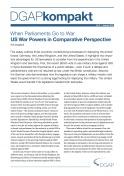January 2016: Unlike the German and British parliaments, the US Congress has thus far failed to bring to a vote an authorization for the use of force in Syria against ISIS. Instead, President Obama relied on a broad interpretation of his constitutional authority. Eric Langland argues that only a vote will give appropriate legitimacy to US military action in Syria, demonstrate popular support, and give Congress a critical opportunity to shape military policy.
Eric Langland was a Robert Bosch Transatlantic Fellow at the DGAP from October 2015 through January 2016 and previously served as a staff judge advocate in the US Marine Corps. He holds a juris doctor from Tulane University and a master’s degree from the London School of Economics.
Click on the box at the right to read the article.

